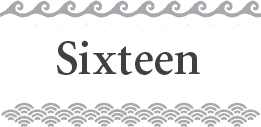
Hotaka is up bright and early the next morning. He dresses for school, glad that his aches and pains have eased, and heads off for breakfast.
As he walks along the rōka he feels the chill in the air and is pleased to see that the kotatsu is set up, the low dining table heated from underneath, with a light quilt tucked all around to keep in the warmth. Breakfast is laid out; a tray for him and one for his mother on opposite sides of the table.
Hotaka bows and bids his mother good morning. ‘Okāsan, ohayō gozaimasu.’
‘Don’t wait for me,’ she says. She is finishing an ikebana arrangement, meticulously setting the final flowers in place.
He leaves his slippers at the door, crosses to the table and slides his feet under the kotatsu. Relishing the warmth, he glances over his breakfast. It’s the usual: steamed rice, miso soup and a range of side dishes – salted salmon, rolled omelette, dried seaweed and fermented soybeans. He hates those natto beans – they smell foul and taste worse – but his mother never gives up pressing them on him. ‘So good for you.’
Hotaka dips a few strips of seaweed into the soy sauce and folds in some rice.
‘You’re up early,’ his mother says.
‘Stuff to do,’ Hotaka mumbles through his food. ‘Before school.’
‘Homework?’
He shakes his head. ‘I have to see Mr and Mrs Suda.’
‘The Puppet People?’
‘Yes – they’re the star attraction of our Memorial Concert.’ He sips the miso soup and scoops up rice with his chopsticks.
‘But they live up in the hills on the other side of the bay,’ his mother says. ‘That’s thirty minutes away.’
‘That’s why the early rise,’ he replies, downing the rice in a few mouthfuls.
His mother finishes the ikebana and joins him at the table. ‘I could drive you,’ she suggests, pouring him some green tea.
‘No, thanks. Good training. Keeps me fit.’ He drinks the tea, swallows some fried tofu and finishes the salted salmon. ‘That was great, Okāsan. Just what I need for a long ride.’ He pushes up from the table. ‘Gotta fly.’
‘Wait,’ his mother says, pointing at the fermented soybeans. ‘What about the natto?’
‘I kept them for you. That’s how thoughtful I am. What a good son, eh?’ He grabs an apple, kisses his mother and leaves.

Hotaka hurtles down Monk Head Hill to the harbourfront. A little way along he turns into the street where Sakura lives with her aunt and uncle. He’s never actually been inside the house because Sakura has never invited him; she can be cagey like that. But he’s met her aunt and uncle, and he knows the house. It’s a tiny prefabricated unit identical to many throughout the town – except for the flowers. Sakura’s aunt loves flowers.
‘They’re sent to remind us of the good things in life,’ she once told Hotaka.
In a plot of land at the front of the house Mrs Kita has planted every inch and has something flowering in each season. At present the Japanese apricot is in bloom and the plum blossoms will burst forth before long.
He slows down as he passes the house, wondering if Sakura is up yet. He’d love her to come with him to see the Puppet People, but decides not to call in; it would be intruding. He rides on, soon realising what a little oasis of colour he’s left behind in Mrs Kita’s garden. A handful of places have been painted, but most are either dull concrete grey or a mix of metal and rust. And none has flowers.
Halfway across town he comes to an area that still hasn’t been cleared since the tsunami. Among the rubble squat dirt-smeared children, some throwing bits of masonry at a derelict house covered in graffiti. They give chase as Hotaka passes, hurling bits of debris at him.
He pedals faster and is soon climbing the escarpment road out of town. When he reaches the top he doesn’t look back, but keeps riding until he reaches what he reckons must be the Puppet People’s house. There is a large bunraku warrior puppet sitting on the roof clutching a welcome sign.
The house makes Hotaka smile, built as it is out of bits scavenged from the tsunami. The front is the bow of a fishing trawler, masts from wrecked boats providing uprights and crossbeams. A large Coca-Cola sign fills part of the front wall. Most of the windows are portholes. A freight container makes a workshop, and the whole house is finished off in a mix of colours as if there wasn’t enough of any one paint to do the job. Hotaka’s smile broadens and soon he’s laughing at this masterpiece of mishmash.
He hops off his bike and leans it against the fence, with cries of Go Oniwaka! echoing in his head.
He hasn’t seen the Puppet People since the day of the tsunami. They disappeared from public life for ages, hiding here, rebuilding their broken lives. Only in the last year or so have they resurfaced. When Miss Abe heard they were making puppets again, she had to have them in the concert. Hotaka can’t wait to see them.
He walks through the gate and up to the front door, wondering what awaits him.